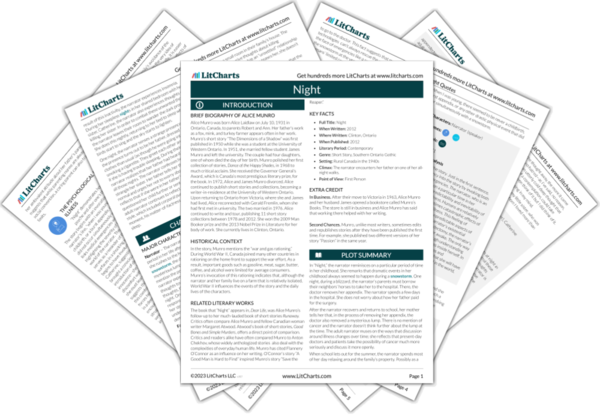The short story “Night” explores the narrator’s existence in isolation, arguing that isolation worsens psychological distress and can even be its root cause. While recovering from an appendectomy, the narrator does fewer chores around the house over her summer break. The lack of physical activity leads to trouble sleeping, and the narrator’s lack of sleep isolates her from her family, as she wanders around alone all night. Her time alone at night while the rest of the family sleeps stirs dark thoughts about killing her sister, Catherine. The narrator doesn’t tell her family about her insomnia and distressing thoughts, so her family’s ignorance of her struggles only makes the isolation worse, creating a self-perpetuating cycle. When she finally tells her father about her dark thoughts, she feels better and begins to sleep again. Though the narrator’s father does not offer any concrete solutions to the issue, simply sharing her experience releases the narrator from her isolation. This conversation stands in stark contrast with her family’s avoidance of the subject of cancer earlier in the story, when the very idea of cancer is “dark, rotting” and unspeakable. Ironically, it is easier for the narrator’s family to talk about disturbing side effects of illness (violent thoughts) than to confront potential illness directly. By exploring the effects of silence and isolation, the author suggests that honest relationships are necessary to combat the effects of one’s inner struggles. In other words, talking about difficult issues is an essential part of preventing them from becoming even bigger, possibly all-encompassing problems.
Silence and Isolation ThemeTracker

Silence and Isolation Quotes in Night
The more I chased the thought away, the more it came back. No vengeance, no hatred—as I’ve said, no reason, except that something like an utterly cold deep thought that was hardly an urging, more of a contemplation, could take possession of me. I must not even think of it but I did think of it.
The thought was there and hanging in my mind.
The thought that I could strangle my little sister, who was asleep in the bunk below me and whom I loved more than anybody in the world.

Unlock explanations and citation info for this and every other Night quote.
Plus so much more...
Get LitCharts A+The east side of our house and the west side looked on two different worlds, or so it seemed to me. The east side was the town side, even though you could not see any town. Not so much as two miles away, there were houses in rows, with streetlights and running water. And though I have said you could not see any of that, I am really not sure that you couldn’t get a certain glow if you stared long enough.
I remembered what I had completely forgotten—that I used to have a sandbox there, placed where my mother could watch me out that north window. A great bunch of overgrown spirea was flowering in its place now and you could hardly see out at all.
Who was it? Nobody but my father. He too sitting on the stoop looking towards town and that improbable faint light. He was dressed in his day clothes.
He said, “People have those kinds of thoughts sometimes.”
He said this quite seriously and without any sort of alarm or jumpy surprise. People have these kinds of thoughts or fears if you like, but there’s no real worry about it, no more than a dream, you could say.
[….] An effect of the ether, he said. Ether they gave you in the hospital. No more sense than a dream.











